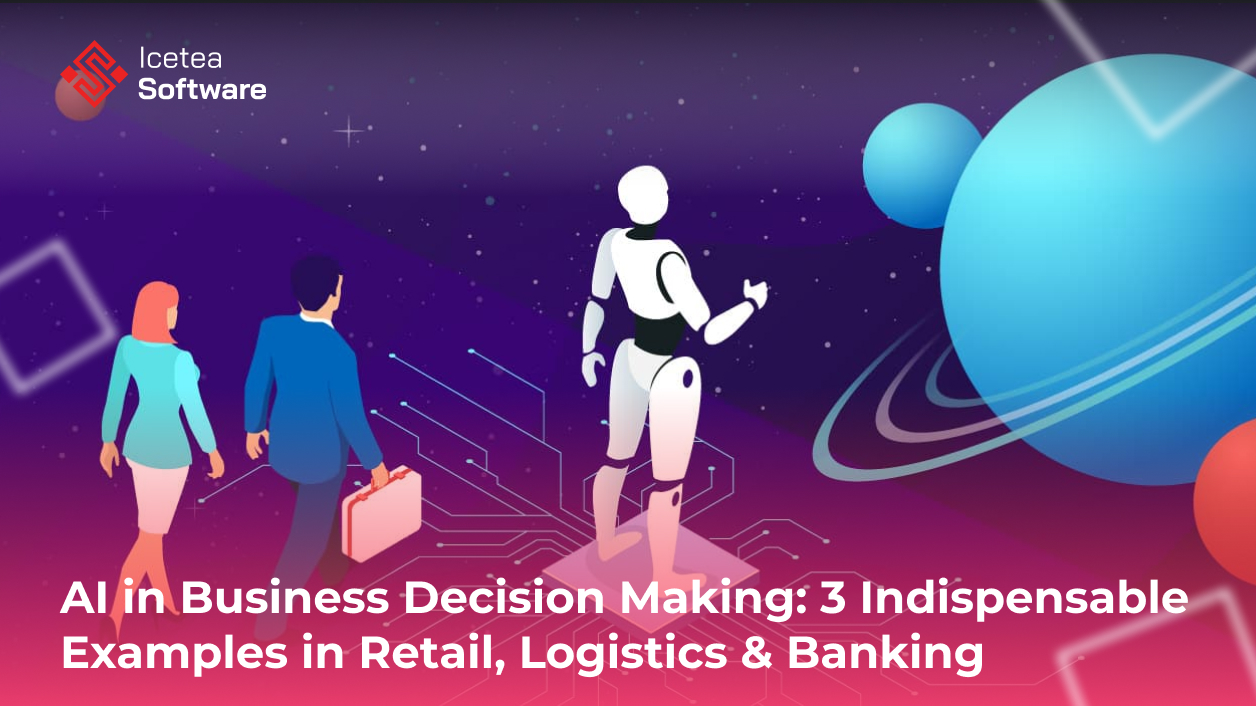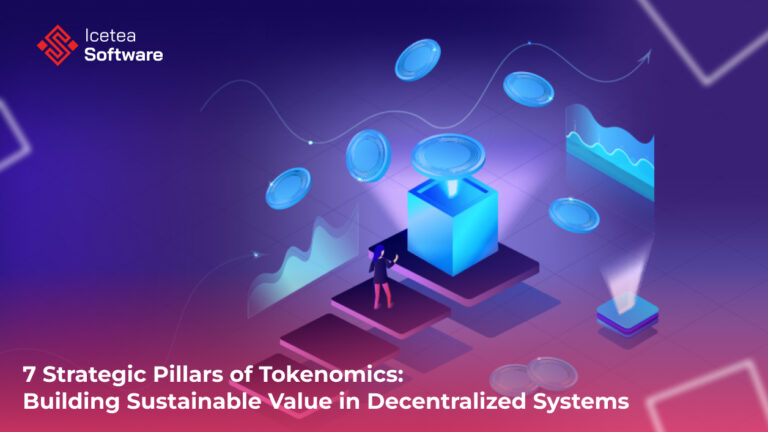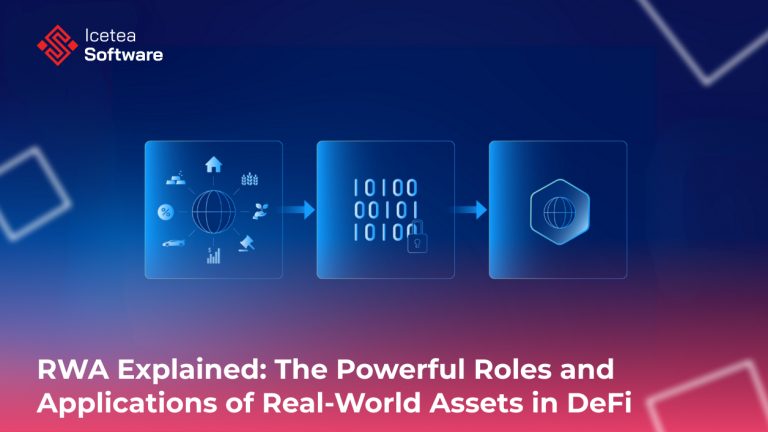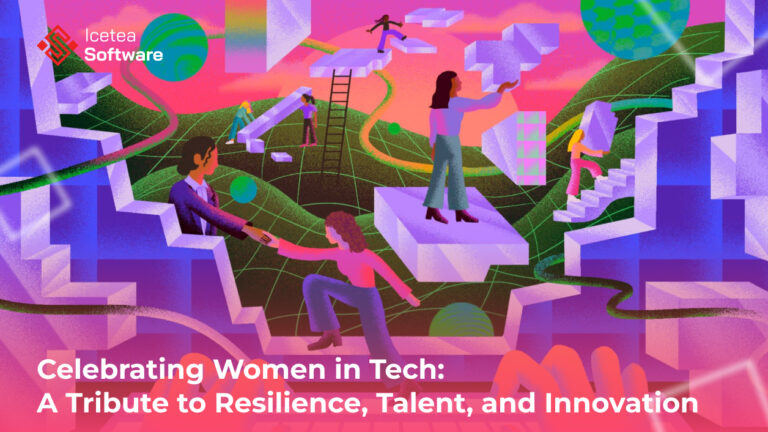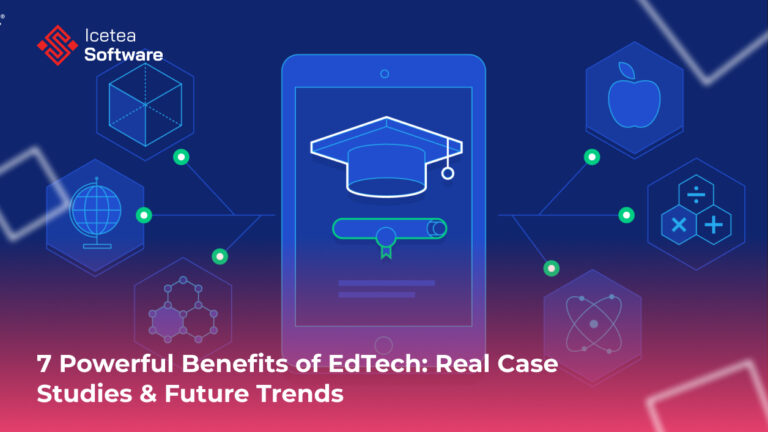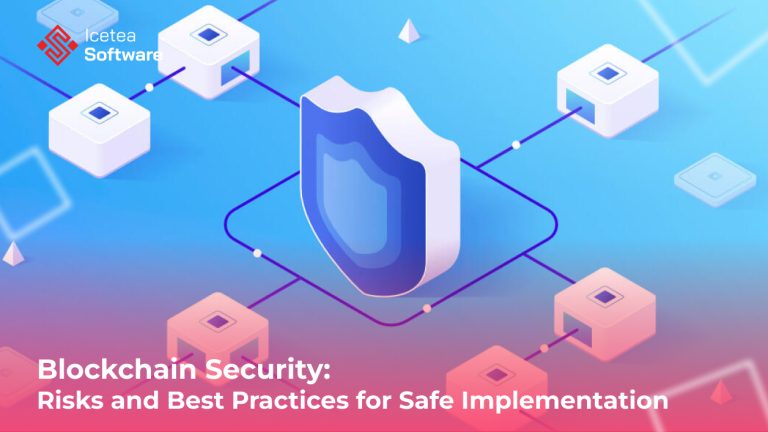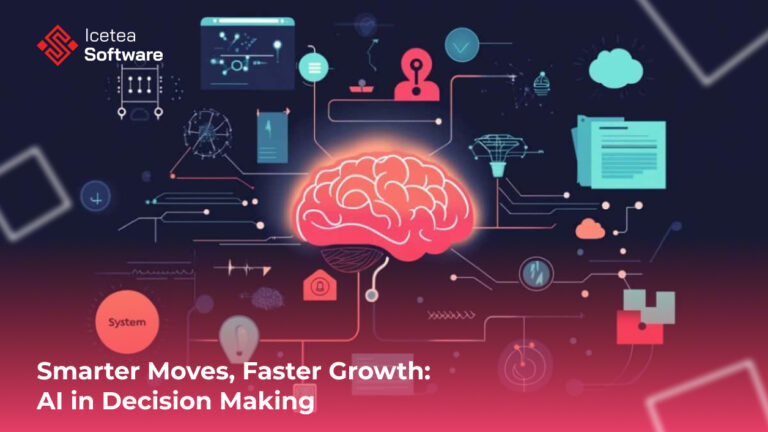AI in Business Decision Making: 3 Indispensable Examples in Retail, Logistics & Banking
- AI in Business Decision Making: How Data Becomes Action in Retail, Logistics, and Banking
- Why AI is Transforming Decision-Making
- Case Study 1: Retail – Personalized Shopping at Scale
- Case Study 2: Logistics – Smarter, Faster, Leaner Supply Chains
- Case Study 3: Banking – From Risk Assessment to Fraud Prevention
- Challenges in AI-Driven Decision Making
- The Future of AI in Decision-Making
- Final Thoughts
- About Icetea Software
AI in Business Decision Making: How Data Becomes Action in Retail, Logistics, and Banking
Artificial Intelligence (AI) is no longer a futuristic concept—it’s a core driver of competitive advantage in today’s data-driven economy. Across industries, companies are harnessing AI in business decision making to transform operations, increase efficiency, and deliver personalized customer experiences.
From artificial intelligence in retail to AI in logistics and AI in banking, this technology is shifting business from slow, reactive strategies to real-time, data-driven decision making. In this article, we’ll explore how AI is changing the decision-making landscape through three industry examples, then analyze the challenges and future directions businesses must prepare for.
Why AI is Transforming Decision-Making
Traditional decision-making is often reactive. Companies rely on historical data and human interpretation, which takes time and risks missing rapidly emerging opportunities or threats. AI changes this paradigm in several ways:
- Real-time data processing – AI ingests streaming data from multiple sources (transactions, IoT devices, customer interactions) and identifies patterns instantly.
- Predictive analytics – AI doesn’t just explain the past; it forecasts future events and suggests preemptive actions.
- Prescriptive intelligence – AI recommends the best course of action based on predicted outcomes.
- Automation of routine decisions – Reducing the cognitive load on human employees so they can focus on strategic and creative tasks.
These capabilities create a shortened decision cycle where insights move from data capture to action execution in minutes or even seconds.
Case Study 1: Retail – Personalized Shopping at Scale
The retail industry has always been data-rich—loyalty programs, point-of-sale transactions, online behavior tracking—but historically, much of that data went underused. Today, AI is turning this untapped potential into personalized, profitable customer experiences.
How It Works
AI-powered recommendation engines analyze browsing history, purchase patterns, social media activity, and even local weather forecasts to tailor offers and suggestions for individual customers.
Real-World Example
Amazon pioneered large-scale personalization by using machine learning models to analyze customer behavior across billions of transactions. Their system doesn’t just recommend similar products—it predicts needs customers haven’t even expressed yet.
Impact on Decision-Making
- Increased sales: According to McKinsey, personalization can boost revenue by 10–15%.
- Inventory optimization: AI predicts demand for specific SKUs, reducing overstock and shortages.
- Dynamic pricing: Algorithms adjust prices in real time based on demand, competition, and supply levels.
Operational Example
A retailer might notice a surge in umbrella sales in a specific city after AI detects a local weather alert. The system can instantly increase stock allocations and push location-based promotions—decisions executed without manual intervention.
Case Study 2: Logistics – Smarter, Faster, Leaner Supply Chains
Logistics is an industry where time literally equals money. Late deliveries, route inefficiencies, or underutilized fleets can cause massive financial losses. AI brings intelligence and adaptability to the supply chain.
How It Works
AI systems integrate data from GPS trackers, warehouse management systems, traffic feeds, and weather forecasts to recommend optimal routing, predict shipment volumes, and detect anomalies.
Real-World Example
DHL employs AI for predictive network management, identifying potential delays before they happen and rerouting deliveries in real time.
Impact on Decision-Making
- Reduced delays: Predictive models have cut delivery time deviations by up to 25%.
- Resource allocation: AI determines the best use of trucks, storage, and labor based on projected demand.
- Sustainability gains: Route optimization reduces fuel consumption and carbon emissions.
Operational Example
An AI system detects that a key delivery route is experiencing unexpected traffic congestion due to an accident. It immediately calculates an alternative route, reassigns delivery vehicles, and updates customer delivery times automatically—avoiding hours of delay without human dispatchers intervening.
Case Study 3: Banking – From Risk Assessment to Fraud Prevention
Banking has always been a data-heavy sector, but AI takes risk analysis, fraud detection, and customer service to new levels.
How It Works
Machine learning models process transaction histories, customer profiles, behavioral biometrics, and third-party credit data to make lending and security decisions in real time.
Real-World Example
JPMorgan Chase uses AI to analyze legal contracts, detect suspicious activity, and assess creditworthiness. Its COIN platform processes documents in seconds—tasks that previously took lawyers thousands of hours.
Impact on Decision-Making
- Fraud detection: AI reduces false positives in fraud alerts, improving customer trust.
- Credit scoring: Models evaluate non-traditional data points, expanding financial access.
- Regulatory compliance: AI systems flag transactions that may breach anti-money-laundering laws.
Operational Example
A banking AI identifies an unusual overseas transaction on a customer’s account, cross-references it with their travel history, and flags it as suspicious. Within seconds, the bank contacts the customer to confirm, preventing potential fraud.
Challenges in AI-Driven Decision Making
Despite the transformative potential, AI adoption comes with significant hurdles that can impact reliability, fairness, and scalability.
1. Data Quality & Integration
AI’s accuracy depends on the data it consumes. Fragmented systems, inconsistent formats, and outdated datasets can lead to incorrect decisions. A logistics firm predicting demand based on partial inventory data could overcommit resources, leading to waste.
2. Algorithmic Bias & Ethics
Biased training data can produce unfair decisions—rejecting certain loan applicants, over-policing certain areas, or under-representing minority consumer preferences. Ethical AI frameworks are essential to prevent such outcomes.
3. Explainability Gap (Black Box Problem)
Complex AI models, especially deep learning, can be difficult to interpret. When businesses can’t explain decisions—like why a loan was denied—it creates compliance challenges and erodes customer trust.
4. Organizational Resistance
Employees may resist AI tools due to fear of job displacement or skepticism about accuracy. Without change management, even advanced AI systems may be underutilized.
5. Cost & Infrastructure Barriers
Enterprise-scale AI requires high-performance computing, vast storage, and expert staff. Smaller firms often lack these resources, widening the digital divide.
The Future of AI in Decision-Making
AI is on a trajectory from supportive analytics tool to autonomous decision-maker, with major implications for business strategy.
1. Autonomous Decision Loops
AI systems will increasingly handle the full cycle: gather data, analyze it, decide, act, and self-adjust—without human intervention. In logistics, this could mean fully automated dispatch and routing systems that adapt minute-by-minute.
2. Federated Learning for Privacy
This technique allows AI to learn from distributed datasets without centralizing them, protecting sensitive information. It’s particularly promising in banking and healthcare, where data privacy is tightly regulated.
3. Multimodal AI Decision Systems
By processing text, images, video, audio, and sensor readings simultaneously, AI will make more context-aware decisions. In retail, for example, AI could combine store camera footage, sales data, and weather forecasts to adjust in-store displays dynamically.
4. Human-in-the-Loop AI
Even as automation expands, human oversight will remain critical for strategic, creative, and ethical decisions. This hybrid approach ensures that while AI handles operational speed, humans guide moral and strategic direction.
5. AI Regulation & Governance as Competitive Edge
Companies that implement transparent, ethical AI early will differentiate themselves in the market. Customers and partners will prefer businesses that can explain AI decisions clearly and demonstrate fairness.
Final Thoughts
AI is not just speeding up decision-making—it is changing the very nature of how decisions are made. Retailers like Amazon are leveraging AI to predict consumer desires, logistics giants like DHL are orchestrating supply chains with real-time precision, and banks like JPMorgan are safeguarding transactions with intelligent fraud detection.
The journey, however, is not without obstacles. Businesses must overcome challenges in data quality, bias, transparency, adoption, and cost to fully realize AI’s potential. The winners will be those who see AI not as a replacement for human judgment, but as a partner in strategic thinking—capable of acting at machine speed while guided by human values.
In the coming decade, AI-driven decision-making will evolve from a competitive advantage to a baseline expectation. The question is no longer whether companies should adopt AI—but how fast they can do it, and how well they can align it with their long-term vision.
About Icetea Software
Icetea Software is a Vietnam-based technology firm specializing in scalable, secure, and future-ready solutions in Web3, AI, and digital transformation. With operations in Vietnam and Korea, the company supports global enterprises and startups through end-to-end technology services, infrastructure development, and innovation consulting.
𝗜𝗰𝗲𝘁𝗲𝗮 𝗦𝗼𝗳𝘁𝘄𝗮𝗿𝗲 – Revolutionize Your Tech Journey!
Website: iceteasoftware.com
LinkedIn: linkedin.com/company/iceteasoftware
Facebook: Icetea Software
X: x.com/Icetea_software
